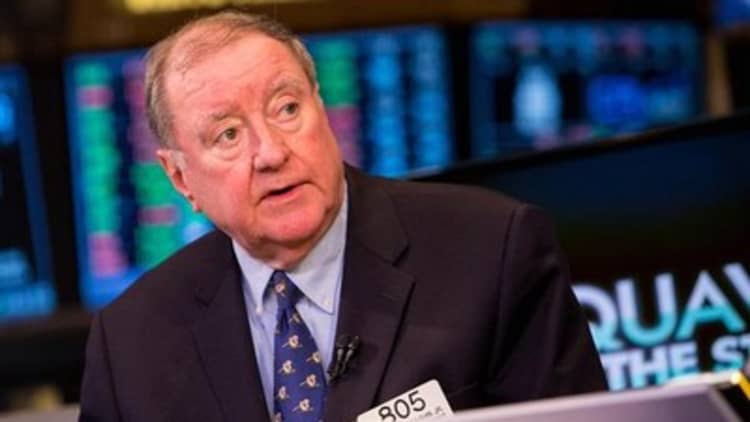
Art Cashin warned on Wednesday that a self-fulfilling prophecy could take hold in bond markets, causing yields to spiral out of the Federal Reserve's control.
Treasurys were on the back foot Wednesday as a rise in the benchmark yield kept pressure on the U.S. bond market.
The 10-year Treasury yield, which moves in the opposite direction of the price, rose to a new eight-month high of around 2.49 percent before trading near 2.48 percent, as bund yields pushed above 1 percent for the first time since last September.
"If the yields move up and people who are in bond funds and other places begin to get nervous and they start to redeem their shares in those bond funds, that may force bonds to liquidate even more and thereby push yields even higher," Cashin told CNBC's "Squawk Alley."
"While the Fed is talking about being measured and data dependent, they're potentially playing with fire here because they could start spontaneous combustion that they can't control," UBS' director of floor operations at the NYSE said. (Tweet This)
Read MoreFund managers dump government bonds, rout continues
The Fed has held interest rates near zero since December 2008. It is widely expected to raise interest rates in 25-basis-point increments, perhaps as early as this year.
Government bonds in both Europe and the U.S. have come under heavy selling pressure over the past week amid a growing perception that a pickup in economic activity and inflation means that ultralow debt yields are no longer justified.
The United States is unlikely to see another taper tantrum as bond yields normalize, but German fixed income is looking scary and could impact U.S. markets, Princeton Securities' Ben Willis said Wednesday.
"The risk to the equities market is in the fixed income market, and that rattle that we saw happen in Germany can very well affect us," Willis told CNBC's "Squawk on the Street." "It's the way it happened, it's the volatility and the swiftness of the move that should scare investors who are in fixed income right now, saying, 'Should I really be here?'"

Asked when and how quickly U.S. Treasury yields could reach levels that ring alarm bells for equities, the senior floor broker said it has become difficult to use a traditional matrix to answer that question in the face of distortions due to interventionist central bank monetary policy.
"The bubble that was created by the central banks, their attempt right now is to deflate it without it popping," he said. "Rising interest rates, when they're allowed to raise normally, are a function of a healthy market and a healthy economy, and that should be a sign to buy equities, not to sell them."
Willis noted that players in the equity markets continue to focus on a few specific sectors: financials, energy and consumer discretionary. Investors are also buying into mid-cap stocks, he added.
Read MoreBove: Investors overlooking 'tremendous' value in banks
The is up 5 percent year to date, compared with a 2.2 percent rise in the .
The S&P 500 is pushing up against the high end of its range at 2,106, but Willis noted financials are one of the few sectors that have seen market activity while the broad market remains quiet.
Banks have benefited from the perception that they'll be able to profit on deposit-based business once the Fed raises rates, said Willis, and on "the anticipation that banks will become banks again, not arbitrage for the Fed."
—CNBC's Dhara Ranasinghe contributed to this story.


